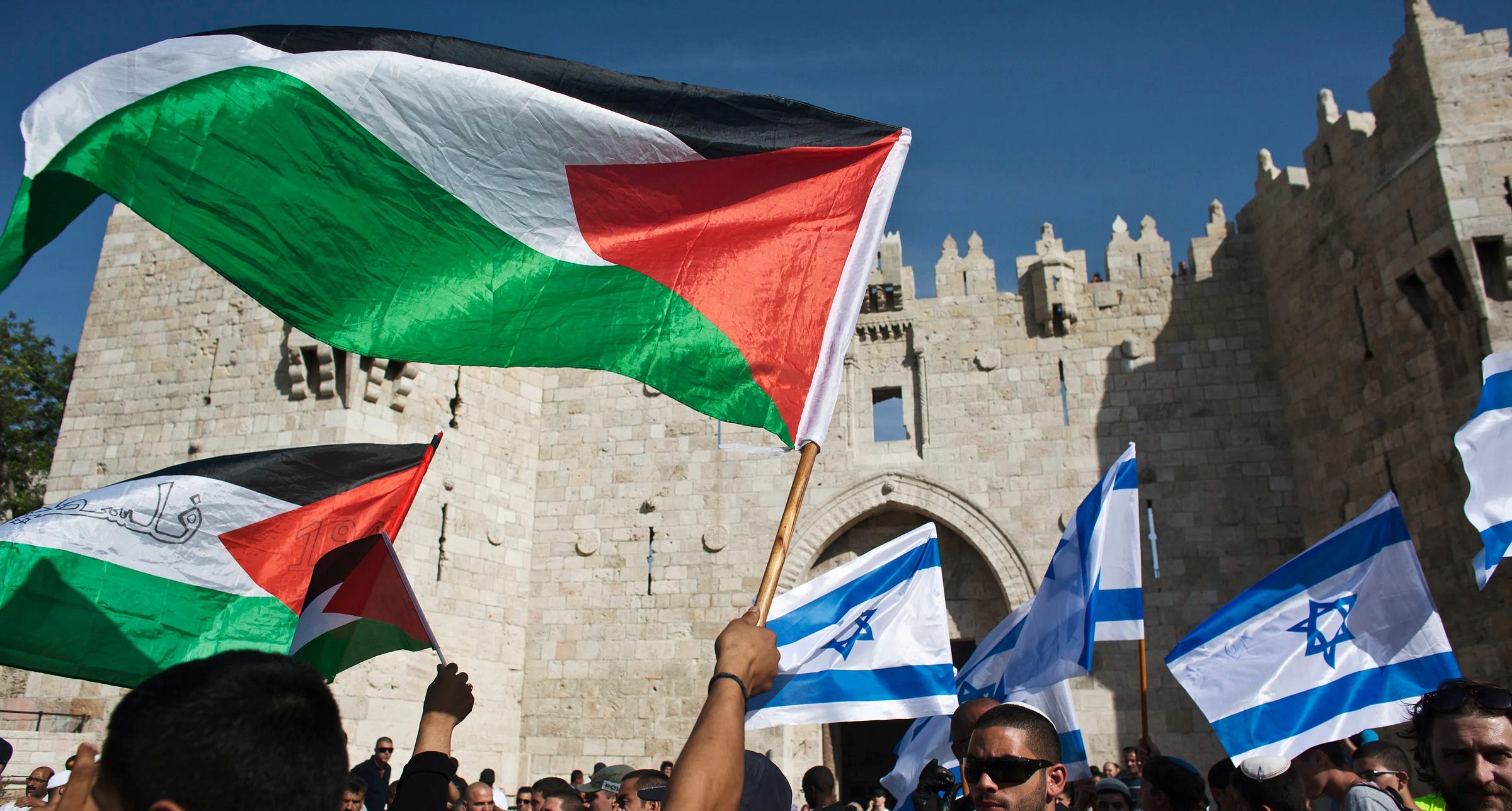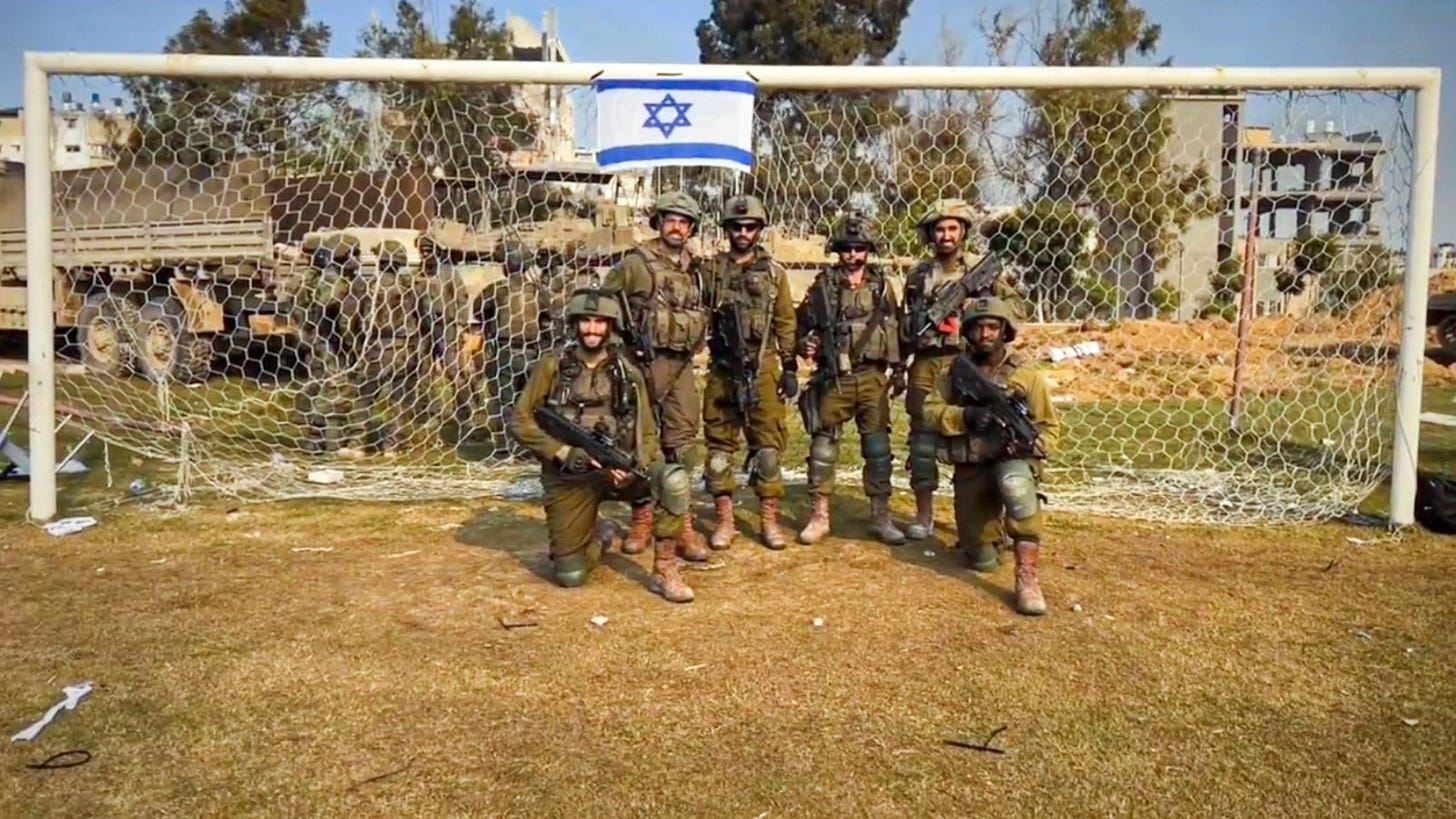Sports cannot—and should not—avoid the war in Gaza
Athletes are being killed, activism is being stifled, and the IOC and FIFA are under pressure to take action—there is no avoiding the Israel-Palestine war."
Welcome to Sports Politika, a newsletter and media platform focused on the intersection of sports, power and politics. This newsletter was founded by investigative journalist and researcher Karim Zidan and relies on the support of readers.
If you have not done so already, please consider becoming a paid subscriber.
After scoring for his team against Trabzonspor on Sunday, Sagiv Jehezkel—an Israeli footballer playing in the Turkish league—celebrated the goal by jogging over the corner of the field, where a group of cameramen and photographers were huddled in position. He pointed to a handwritten message on a bandage on his left wrist that included the Star of David and “100 days, 7/10.”
Jehezkel’s message—a reference to the Hamas attack on Israel on Oct. 7 and the number of days that more than 130 Israeli hostages have been held in Gaza—drew fierce criticism from all corners of Turkish society. The Israeli footballer was suspended from his club Antalyaspor while Turkey’s justice minister Yilmaz Tunc announced an investigation into Jehezkel for “inciting people to hatred and hostility.”
Turkish authorities detained Jehezkel after the match and placed him in police custody. He was released on Monday after being questioned overnight by police regarding his goal celebration. The footballer rejected accusations of inciting hatred, saying that his message was intended to be a call to end the war in Gaza.
“I did not act to incite or provoke anyone. I am not a pro-war person,” broadcaster NTV reported Jehezkel as saying. “There are Israeli soldiers held hostage in Gaza. I am someone who believes that this 100-day period should end now.
“I want the war to end,” he continued. “That’s why I showed the message here.”
In a separate incident, Istanbul club Basaksehir said it would bring disciplinary action against Israeli midfielder Eden Kartsev for harming "sensitive values" in Turkey. Kartsev was also briefly detained on Monday about a social media post in which he called for the release of the remaining hostages held in Gaza.
The incidents involving Jehezkel and Kartsev reflect the challenges confronted by players expressing their views on the the war in Gaza, underscoring that, despite attempts to steer clear, sports remains entangled in the complexities of the Israel-Palestine conflict.
France’s minister of the interior accused French-Algerian footballer Karim Benzema of having ties with the Muslim Brotherhood after he expressed support for Palestine back in October. A French senator later called for Benzema to be stripped of his Ballon d'Or—the highest individual award for a football player—and to be deprived of his French nationality.
Dutch-Moroccan footballer Anwar El Ghazi had his contract with Bundesliga club Mainz 05 terminated following a pair of social media posts, one of which included the slogan "From the river to the sea, Palestine will be free."
Earlier this month, Youcef Atal, an Algerian footballer playing for French club Nice, received an eight-month suspended prison sentence and was fined 45,000 euros after a court found him guilty of inciting religious hatred after sharing an Instagram video of a preacher promoting attacks on Israelis. Atal later apologized and said he condemns violence “no matter where in the world.”
Football became firmly embedded in the ongoing war shortly after Christmas, when harrowing footage emerged showing Israeli troops turning Yarmouk stadium into a makeshift internment camp for Palestinian detainees, drawing parallels to Pinochet and Franco. Dozens of men, women and children were rounded up, stripped down to their underwear, and blindfolded while armed soldiers and tanks encircled the field. A soldier carrying a baby wrapped in a blanket could be seen at the end of the video.
More footage continued to emerge, including photos showing tanks patrolling the field, soldiers posing in front of a group of detained women and children, and blindfolded men and women forced to kneel in front of a goal with the Israeli flag attached to the netting.
The transformation of Yarmouk Stadium into a detention centre led the Palestinian Football Federation to send letters to the International Olympic Committee (IOC) and FIFA demanding an "urgent international probe into (Israeli) occupation crimes against sports and athletes in Palestine".
“This blatant and scandalous violation of all covenants is added to a long series of violations against Palestinian sports, including the killing and arrest of players,” read the PFF statement. “This is a crime that the international sports institutions cannot tolerate, silence and ignore.”
Meanwhile, the AFC Asian Cup kicked off in Qatar with potent tributes to several Arab countries and cultures, including Palestine. Qatari singer Dana Al Meer performed a rendition of Lebanese diva Fairuz’s Zahrat Al-Mada’in—one of the most celebrated songs about Palestine in the Arab world.
The Palestinian national team, which is participating in this month’s Asian Cup, is also carrying the burden of the ongoing war, where more than 24,000 Palestinians have been killed since Israel began bombing the besieged strip more than 100 days ago.
“Everyone is glued to the news, before and after training, be it on the bus or at the hotel,” Palestine’s Tunisian coach, Makram Daboub, told AFP during a recent training camp in Saudi Arabia, shortly before arriving in Qatar. The players, Daboub said, “have a constant feeling of anxiety for their families”.
In December, the Palestine’s football federation released a report detailing the killing of 55 football players since Oct. 7, the vast majority of whom were under the age of 18. Since then, more names have been added to the list, including Hani Al-Masry, the former football player and general manager of the national Olympic team.
Beyond football, the ongoing war has taken a toll on other sports as well. Twelve days before the Under-20 men’s world championship, the International Ice Hockey Federation announced a ban on Israel due to “concerns for the safety and security of all participants.”
The following day, the IIHF indicated that Israel could still participate in upcoming world championships and that the decision only applies to the under-20 tournament in Bulgaria.
The Israel-Palestine discourse is also permeating the combat sports space.
Following his most recent fight at UFC 294 in Abu Dhabi, Chechen-born star Khamzat Chimaev called for “peace” in his post-fight interview in English before asking dictator Ramzan Kadyrov to send him to Palestine to die with his Muslim brothers in a follow-up message in Chechen. Meanwhile, Haim Gozali—a far-right Israeli MMA fighter—made headlines after inscribing an artillery shell bound for Gaza with the names of Muslim MMA fighters.
Gozali’s actions caused outrage online, as many of those same artillery shells were responsible for much of the devastation in Gaza. For example, Nagham Abu Samra, a Palestinian karate champion who lost her leg in an Israeli air strike in Gaza last month that killed her sister Rosanne, died in Egypt after being taken to the country for treatment. The 24-year-old owned a Gaza-based gym where she offered karate training to girls and young women.
“I wanted every girl to feel her strength from within, not from those surrounding her,” Abu Samra said in a Ted Talks spotlight interview in 2021. “I also wanted for them to be able to protect themselves and be able to make their own decisions in life.”
In the wake of the ongoing humanitarian crisis in Gaza, there is a growing call for international governing bodies to take action against Israel. Both Palestine and Jordan’s football federations are demanding that FIFA and the International Olympic Federation place sanctions on Israel’s sports federations, arguing that the international sports community had a duty to “stop the aggression against Palestinians in Gaza and the occupied territories.”
Yet neither FIFA nor the IOC have issued statements condemning Israel’s assault on Gaza. While both were quick to take action following Russia’s invasion of Ukraine, including banning Russia from participating in the 2022 World Cup and forcing Russian athletes to participate as neutrals at the Paris Games later this year, they have refused to take similar action against Israel. IOC officials later absolved itself of responsibility by claiming that the “two situations cannot be compared.”
The escalating pressure on entities such as the IOC and FIFA serves as a poignant illustration of the sports world becoming increasingly enmeshed in the Israel-Palestine narrative. And as the death toll continues to rise and a humanitarian ceasefire remains out of reach, we will likely see more examples of athletes protesting their cause, and activists amplifying calls for sanctions.
Will sports leaders heed their call?
Sports Politika is a media platform focusing on intersection of sports, power and politics. Support independent journalism by upgrading to a paid subscription ( or gift a subscription if you already have your own). We would appreciate if you could also like the post and let us know what you think in the comment section below.





Appreciate you Karim!
Karim, you write well, and I enjoy your column in The Guardian. You write on many, many subjects, and have challenged many of my ways of thinking. Thank you. Your piece on the King's coronation was one such, and I mention it because yours is a cogent opinion not at all shared by the people of Britain.
So, do you have in your universe a space where people can just not have an opinion, or where they might legitimately just want to get on with their lives because otherwise they'd be spending 25 hours a day 8 days a week campaigning against everything you criticise? Do you yourself not get exhausted?
Your piece about Mohamed Salah is a case in point: his day job is to play football, and he is wonderful to watch (I am neither a football nor a Liverpool fan, but he sparkles like his smile). My guess is that he is more devoted to his wife and children than he is to football, but apparently his actual job is be a beacon to all Arabs and Muslims, he must not put up a Christmas tree, etc, etc, etc - it just goes on and on and doesn't stop. Is there no space for people to just be? For those who let others live and let live to live and let live?